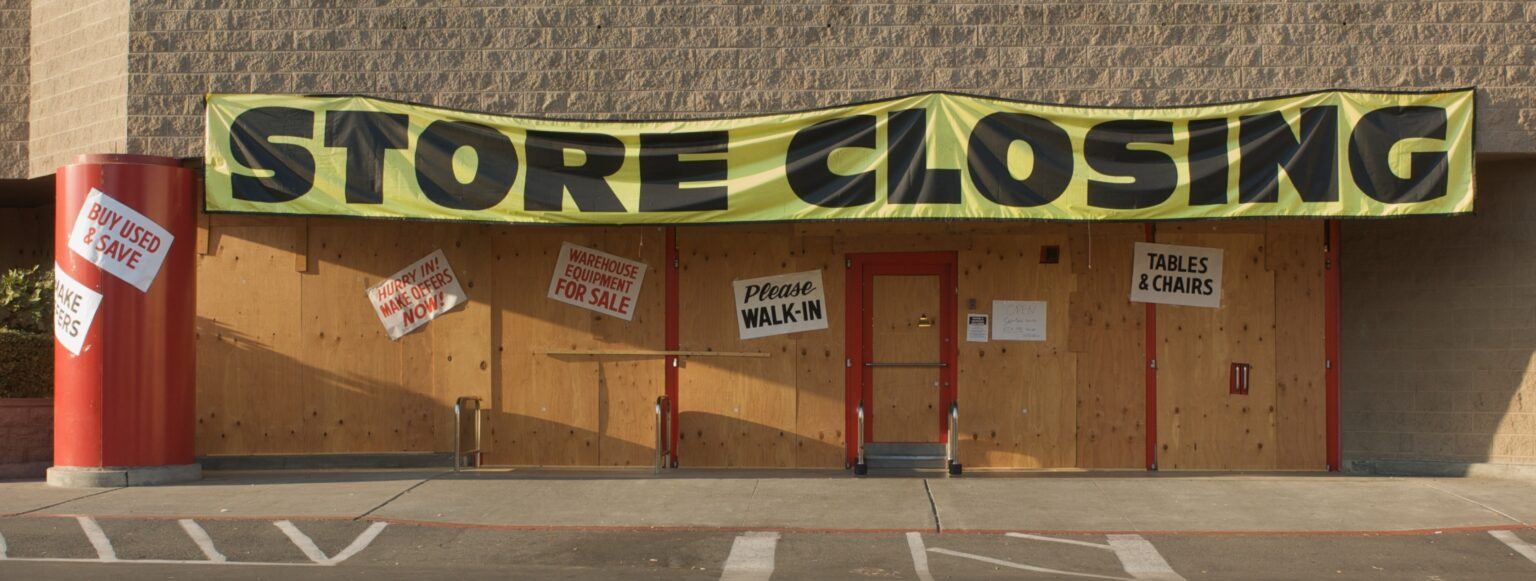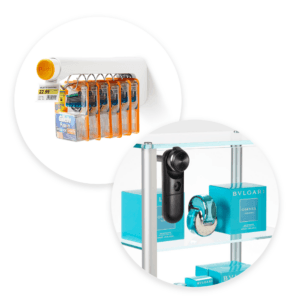The Hidden Consequences of Retail Theft and Why You Need Reliable Retail Security

In 2023, just under 5,000 retail stores closed, and a considerable amount of those closed due to rampant theft. Although it’s hard to pinpoint just how many closed due to organized retail theft, some retailers like Dollar Tree and Target haven’t been shy in disclosing that some of their locations just couldn’t find a solution to shoplifting and as a result had to halt operations.
As a small or medium-sized business owner, you may be thinking this only happens to major retailers, or that you don’t have their budget to implement multiple anti-theft solutions. If you’ve been turning a blind eye or waiting for a catastrophic loss to invest in retail security, you’re likely hurting your own business.
In this blog, we’ll explore how retail theft impacts more than just the retailer, highlighting the critical role of anti-theft devices in protecting more than just inventory.
The Negative Impact of Rampant Retail Theft
We all know that shoplifting hurts stores, and this sometimes makes people turn a blind eye. “I don’t shop there anyway, so it doesn’t affect me.” It’s an easy attitude to have when an issue doesn’t hit close to home, but shoplifting has far-reaching effects that impact not just the retailer, but the surrounding community as well:
- Increased prices: This is a given, and often expected. Loss of merchandise or damage to stores leads stores to hike prices to recoup loss. While insurance might cover some of these losses, there are deductibles, increased premiums, and potential delays in reimbursement. The overall financial hit encourages retailers to pass these costs onto consumers through higher prices.
- Loss of jobs: If theft can’t be reduced to the point where stores are forced to close, it means there are fewer jobs available in the community. This can have a domino effect, potentially leading to entire communities disappearing as families move elsewhere for work or to neighborhoods where they can shop safely without fear of violent theft.
- Increased taxes: Closing stores means less local and state tax revenue, which can lead administrations to raise taxes to make up for the shortfall.
- Increased workload for local law enforcement: Law enforcement officials are already understaffed and overworked. If stores can’t implement anti-theft measures to reduce theft, the burden will fall on law enforcement and the judicial system, further straining an already overloaded system.
- Loss of small businesses: small businesses or “mom and pop” shops are considered the backbone of America. They contribute to a diverse culture, drive innovation through healthy competition, and provide nearly 50% of all jobs. If local businesses can’t address retail security challenges, it could lead to a situation where only large corporations remain, potentially pushing monopolies and limiting options for consumers.
- An unwelcome environment for customers: Coverage of smash-and-grab robberies is flooding newsfeeds and causing genuine concern. No one should have to shop for groceries or everyday essentials while fearing a violent theft. However, overly aggressive security measures could also deter customers, driving them away from physical stores and toward online shopping instead.
The negative effects of rampant retail theft extend far beyond the immediate losses faced by retailers. They ripple through the community, impacting everything from local economies to public safety. As we’ve seen, these issues highlight the need for effective security measures.
The Hidden Impact of Reliable Retail Security Measures
Retail security does more than just protect your inventory—it plays a key role in maintaining the health and vibrancy of your business and community. Despite the significant financial losses many small businesses face due to theft each month, 7% still report having no security measures in place.
Below, we’ll explore how implementing store security brings hidden benefits that go beyond mere protection, offering valuable advantages for your business and its environment.
1. Protecting Your Inventory
One of the main reasons for having strong security is to protect your stock. Retail stores face risks like theft and vandalism, which can lead to significant losses. Installing surveillance cameras, having alarm systems, and employing security staff are some ways to keep your inventory safe. When your products are secure, it helps prevent stock shortages and keeps your business running smoothly.
2. Creating a Safe Shopping Environment
Security isn’t just about protecting your inventory; it’s also about making sure your customers feel safe. When shoppers know they’re in a secure environment, they’re more likely to visit your store and make purchases. Good security practices, like having visible security personnel and well-placed cameras, contribute to a more pleasant shopping experience and can help prevent disruptive incidents.
3. Tackling Internal Theft
Internal theft, or employee theft, can be a big issue. It’s not just about physical items—there can be fraud or unauthorized discounts as well. By setting up strong security measures, like regular audits and clear policies, you can help prevent dishonest behavior. A well-thought-out security system makes it easier to catch and address issues before they become major problems.
4. Reducing Financial Risks
The costs associated with poor security can add up quickly. Besides the direct losses from theft, you might face higher insurance premiums and legal fees. Investing in security can help mitigate these costs, protecting your bottom line. A good security setup can also reduce the need for emergency repairs and help keep your expenses in check.
5. Meeting Legal Requirements
Sometimes, security isn’t just a best practice—it’s a legal requirement. Depending on your location and type of store, there might be specific rules you need to follow. Complying with these regulations not only helps you avoid legal trouble but also shows your commitment to maintaining a secure environment for both customers and employees.
6. Protecting Digital Information
In today’s digital world, security extends beyond physical protection. Data breaches and cyber-attacks can jeopardize sensitive customer information. Securing your digital assets with measures like encrypted payment systems and up-to-date software is crucial. Keeping your data safe helps build trust with your customers and protects your business from costly breaches.
7. Strengthening Your Brand’s Reputation
How you handle security can significantly impact your brand’s reputation. Stores that are known for being secure are often seen as more trustworthy. Positive word of mouth and good customer reviews can follow from a strong security presence. On the other side, security lapses can hurt your brand’s image. Investing in security contributes to a solid reputation that attracts and retains customers.
8. Being Ready for Emergencies
Good security also means being prepared for emergencies. Whether it’s a natural disaster, a health crisis, or another unexpected event, having a plan in place is important. Effective emergency preparedness includes clear procedures, staff training, and communication plans to manage crises smoothly and minimize disruption.
9. Supporting the Community
Effective retail security not only benefits the business but also has a positive impact on the community. When stores are secure and can operate smoothly, they contribute to a safer and more vibrant local environment. This security helps create a sense of stability, encouraging more foot traffic and supporting local events and initiatives. Also, by reducing crime and vandalism, strong security measures help foster a community where residents feel safer and more invested. This collective sense of security can improve overall quality of life, making neighborhoods more appealing and resilient.
10. Protecting Jobs and Employees
Retail security is crucial for safeguarding not just inventory but also the jobs and well-being of employees. Effective security measures help prevent theft and vandalism, which can otherwise lead to store closures or downsizing. When businesses face fewer losses, they’re more likely to remain open and continue employing staff.
A secure work environment boosts employee morale and job satisfaction. Employees are more likely to feel valued and safe in their workplace when they know their employer is committed to their protection. In turn, this contributes to lower turnover rates and a more stable workforce. Overall, investing in retail security helps create a more secure and supportive environment for both employees and their families.
By ensuring a secure environment, you protect your workforce, contribute to a thriving community, and enhance the stability of your operations. As we continue to explore the benefits of retail security, it becomes clear that these measures are integral to maintaining not only a safe shopping experience but also a thriving and resilient business ecosystem.
Protect Your Merchandise and Support Your Community with Anti-Theft Devices from InVue

InVue is at the forefront of creating innovative retail security solutions tailored for businesses of all sizes. Our advanced anti-theft devices address the myriad challenges discussed, from protecting inventory and reducing financial risks to enhancing customer safety and supporting community well-being. By choosing InVue, you’re not only investing in cutting-edge security measures but also contributing to a safer, more vibrant environment for your business and community.
If your business is struggling with security issues or if you’re looking to enhance your overall security strategy, don’t hesitate to reach out. Contact us today to discover how InVue can help protect your store, support your employees, and make a positive impact on your community.